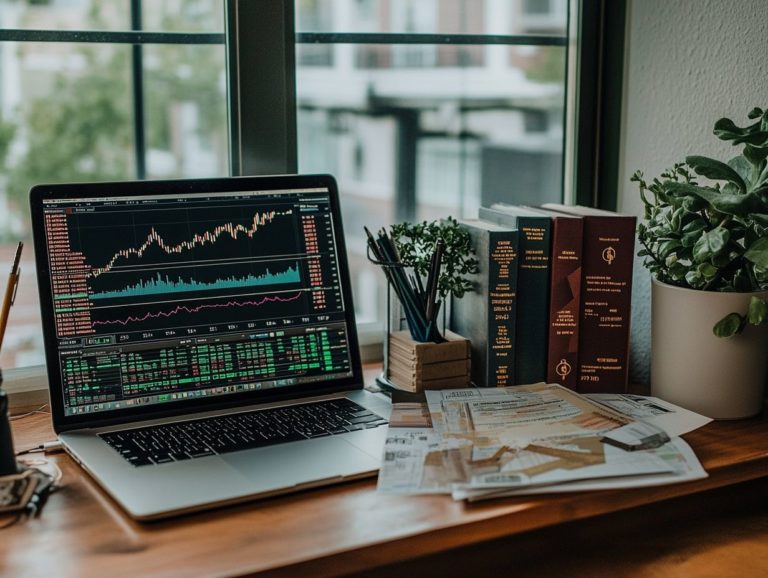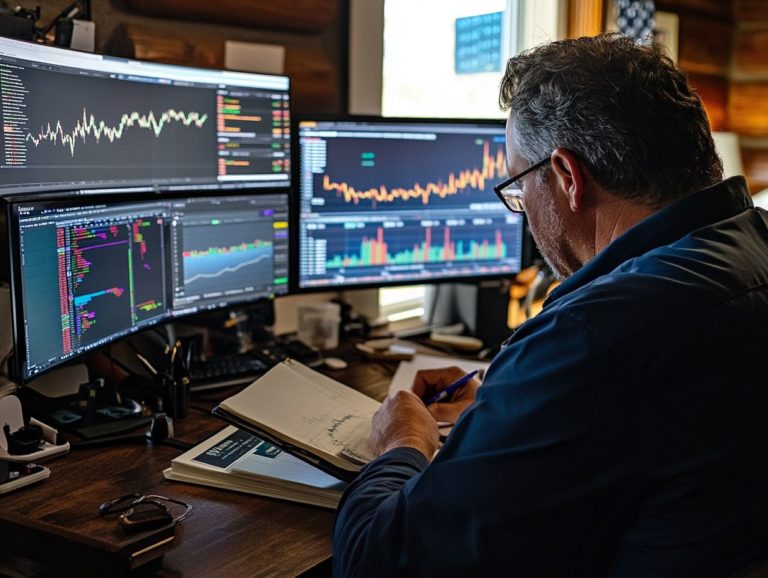The Link Between Self-Awareness and Trading Success
In the fast-paced world of trading, your success isn t just about market knowledge or technical prowess; it s profoundly connected to your self-awareness.
Recognizing your own biases and emotions can dramatically shape your trading decisions, often tipping the scales between profit and loss.
This discussion delves into how self-awareness influences trading performance, the risks that come with ignoring it, and practical strategies to cultivate this vital trait.
By honing your self-awareness, you can improve your trading outcomes and navigate challenges with greater finesse.
Get ready to unlock the secret to your trading success now!
Contents
- Key Takeaways:
- The Importance of Self-Awareness in Trading
- The Impact of Self-Awareness on Trading Success
- Developing Self-Awareness as a Trader
- Overcoming Challenges in Developing Self-Awareness
- Maintaining Self-Awareness in Trading
- Frequently Asked Questions
- What is the link between self-awareness and trading success?
- How does self-awareness impact trading success?
- Can self-awareness be learned and developed?
- How does self-awareness affect risk management in trading?
- What are common obstacles to self-awareness in trading?
- How can self-awareness lead to long-term success in trading?
Key Takeaways:

- Understanding your own biases and emotions is crucial for trading success.
- Self-awareness greatly improves trading performance; ignoring it can be dangerous.
- Developing self-awareness as a trader requires practical strategies and overcoming common obstacles.
The Importance of Self-Awareness in Trading
Self-awareness is an important skill for every trader, especially for those fully immersed in the details of financial markets. It s essential to maintain a sharp awareness of your own emotional states and biases while navigating these complexities.
By cultivating self-awareness, you can pinpoint and address your weaknesses. This introspective ability enhances your understanding of the psychological factors at play, giving you the power to adapt seamlessly to shifting market conditions. You can steer clear of pitfalls driven by emotions or thought patterns that can mislead you, such as optimism bias, which is when you expect better results than are realistic.
Understanding Your Own Biases and Emotions
Understanding your own biases and emotions is crucial for developing self-awareness as a trader. This knowledge allows you to recognize how these factors influence your trading decisions.
Take, for instance, optimism bias. It can skew your perception of potential gains, leading you to take on excessive risks based on unrealistic expectations. It’s vital for you to acknowledge that these viewpoints can cloud your judgment, often resulting in suboptimal decision-making.
Confronting these biases requires practical methods. Set clear rules for your trading behavior and maintain a comprehensive journal to reflect on your past trades. Balancing your focus and attention span is equally essential; this fosters rational thinking and better strategy formulation, guiding you toward more disciplined and informed choices.
The Impact of Self-Awareness on Trading Success
The influence of self-awareness on trading success is profound, as it fundamentally shapes your capacity to respond to market conditions and make informed decisions with precision. Understanding the role of accountability in trading success can further enhance your decision-making process.
Recognizing your emotional triggers and biases allows you to navigate the complexities of trading with greater clarity and confidence.
How Self-Awareness Can Improve Your Trading Performance

Self-awareness can profoundly enhance your trading performance, enabling you to recognize and adjust your decision-making processes in response to your emotional state.
When you develop a clear understanding of your emotional triggers and behavioral patterns, you become better equipped to navigate market fluctuations. Seasoned traders often highlight the importance of patience during volatile periods; staying calm can prevent you from making hasty decisions that result in losses.
By reflecting on your past experiences, you can learn to spot signs of anxiety or overconfidence. Ultimately, cultivating self-awareness through consistent practice helps you maintain a disciplined approach, significantly minimizing the risks associated with emotional trading pitfalls.
The Dangers of Ignoring Self-Awareness in Trading
Ignoring self-awareness in trading can expose you to significant risks, including missed opportunities and harmful consequences arising from unchecked emotional responses.
When you lack emotional self-awareness, impulsive decisions may replace rational analysis. These impulsive decisions are driven by fleeting feelings.
For example, if fear grips you during market downturns, you might hastily sell off your assets. Conversely, allowing excessive greed to dictate your actions could lead to over-leveraging on high-risk trades.
Such biases not only cloud your judgment but can also heighten stress, anxiety, and regret, creating a vicious cycle that impedes long-term success.
By recognizing your emotional triggers, you can maintain your composure. This enables sharper decision-making that aligns with your strategic objectives and ultimately enhances your trading outcomes.
Developing Self-Awareness as a Trader
Developing self-awareness as a trader requires you to implement practical strategies that enhance both your emotional self-awareness and your ability to recognize your feelings, allowing you to effectively identify your internal emotional states.
Practical Strategies and Techniques
Practical strategies and techniques to enhance your self-awareness can include methods like maintaining a trading journal and practicing mindfulness.
By diligently recording your trades, you can reflect on your decisions. This helps you identify patterns in your emotions and outcomes that might otherwise slip through the cracks.
This reflection allows you to pinpoint the triggers that lead to impulsive actions or poor judgment. Incorporating mindfulness practices encourages you to remain present, managing stress and anxiety during trading hours.
Techniques such as deep breathing or brief meditation breaks can create the mental space necessary for processing your thoughts and emotions more effectively. These practices cultivate a heightened awareness that supports more disciplined and thoughtful trading behavior.
Overcoming Challenges in Developing Self-Awareness

Overcoming the challenges of developing self-awareness is crucial for you as a trader. By enhancing your emotional self-awareness, you can navigate the psychological aspects of trading with greater ease and effectiveness.
Common Obstacles and How to Overcome Them
Common obstacles to developing self-awareness often include emotional biases that cloud your judgment and impede effective decision-making. These biases can show up in various ways perhaps through overconfidence, fear of loss, or an urge to recover from past missteps.
This can lead to impulsive choices or a tendency to stray from your well-crafted strategy. Such distractions create a cycle of emotional turbulence, pulling you away from the objective analysis essential for successful trading.
To counter these challenges, incorporate mindfulness techniques into your routine, maintain a trading journal, and establish a consistent review process to reflect on your emotions and decisions.
By nurturing emotional self-awareness, you can significantly elevate your ability to make rational, informed choices in the market.
Maintaining Self-Awareness in Trading
Don t wait! Maintaining self-awareness is vital to achieving long-term success. It requires you to adopt a range of strategies and practices that foster emotional insight and enhance your overall trading performance.
By cultivating this awareness, you set the stage for more informed decisions and a more rewarding trading experience.
Tips for Sustaining Self-Awareness in the Long Run
To maintain long-term self-awareness, focus on enhancing your emotional self-awareness. Regularly evaluate your emotional state.
Establishing a self-assessment routine can be a game-changer. Set aside time to review your trading results and emotional states.
Keeping a journal that captures your trading experiences and emotional responses can lead to amazing insights over time. Seeking feedback from trusted peers or mentors offers fresh perspectives, promoting growth and helping you adapt to challenges.
Embracing a proactive approach to evaluations empowers you to make informed decisions in your trading journey.
Frequently Asked Questions

What is the link between self-awareness and trading success?
Understanding your emotions, biases, and tendencies impacts your trading decisions. When you’re self-aware, you can identify and manage these factors for better trading outcomes.
How does self-awareness impact trading success?
Self-awareness helps you recognize and control emotions like fear and greed. This understanding allows you to avoid impulsive decisions and trade more strategically.
Can self-awareness be learned and developed?
Yes! You can learn self-awareness through practices like meditation, journaling, and seeking feedback. It s an ongoing process that greatly benefits traders.
How does self-awareness affect risk management in trading?
Being self-aware helps you assess your risk tolerance accurately. It also aids in deciding when to cut losses and stick to a disciplined risk management plan.
What are common obstacles to self-awareness in trading?
Obstacles include ego, overconfidence, and denial. Recognizing these challenges is crucial for trading success.
How can self-awareness lead to long-term success in trading?
Self-awareness fosters discipline, consistency, and adaptability. Traders who are self-aware stick to their plans and adjust when needed, leading to profitable strategies!






